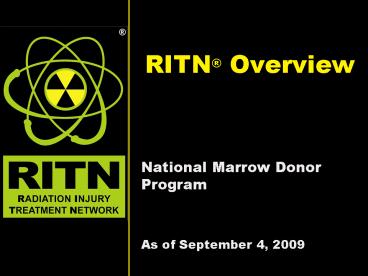RITN Overview - PowerPoint PPT Presentation
1 / 21
Title:
RITN Overview
Description:
... Donor Program (NMDP) and The American Society for Blood ... Science & Public Health. Immediate Office. of the ASPR. Office of. Preparedness & Emergency ... – PowerPoint PPT presentation
Number of Views:43
Avg rating:3.0/5.0
Title: RITN Overview
1
RITN Overview
- National Marrow Donor Program
- As of September 4, 2009
2
Agenda
- Who is RITN?
- What Needs Does RITN Fill?
- What Can RITN Offer?
- What is RITN Doing to Prepare?
- Concerns
3
Charter
- The Radiation Injury Treatment Network (RITN)
provides comprehensive evaluation and treatment
for victims of radiation exposure or other marrow
toxic injuries. RITN develops treatment
guidelines, educates health care professionals,
works to expand the network, and coordinates
situation response. RITN is a cooperative effort
of the National Marrow Donor Program (NMDP) and
The American Society for Blood and Marrow
Transplantation (ASBMT).
4
RITN Goals
- Provide facilities and staff for intensive
supportive care and treatment expertise in the
aftermath of a marrow toxic incident resulting in
mass casualties. - Educate hematologists, oncologists, and stem cell
transplant practitioners about their potential
involvement in the response to a radiological
incident.
5
RITN Development Timeline
- 1986 - Initiation of NMDP - Navy relationship
- 86-01 - Response network realized as an
unfulfilled need - 2001 - NMDP begins organizing concept of core
network - 2003 - NMDP transplant center physicians discuss
options - 2004 - ASBMT joins initiative
- 2005 - ASBMT increases emphasis
- NMDP solicits HSCT physician support
- 2006 - NMDP initiates agreements with 13
transplant centers - RITN steering committee finalizes materials
- 2007 - Expansion of RITN to include donor centers
and cord blood banks (52 total centers) - Tomorrow
6
Key Partners in the Development of RITN
- American Society for Blood and Marrow
Transplantation (ASBMT) - Department of Defense - Office of Naval Research
(ONR) - Health Resources and Services Administration
(HRSA) - Center for International Blood and Marrow
Transplant Research (CIBMTR) - Radiation Emergency Assistance Center/Training
Site (NNSA, DOE) - Dept. Health Human Services - Asst. Secretary
of Preparedness and Response (DHHS-ASPR) - National Library of Medicine - Radiological Event
Medical Management (NLM-REMM) www.remm.nlm.gov - Leading hematopoietic stem cell transplantation
physicians
7
Organization of RITN
8
RITN Distribution Across USA
9
(No Transcript)
10
Possible Events Involving RITN
- Focus of preparations Any incident resulting in
mass casualties with a marrow toxic injury - Examples of possible events
- Radiological
- Improvised Nuclear Device (IND)
- Military grade nuclear weapon
- Radiological exposure device (open source)
- Radiological Dispersal Device (RDD) a.k.a. dirty
bomb - Less likely to overwhelm existing response
resources - Chemical Mustard gas
- Unknown
11
What Need Does RITN Fulfill?
- Provide ready facilities with practicing
specialists for intensive supportive care and
treatment - Infrastructure and process for transplant if
needed - Increases transplant community awareness about
potential need of their services in time of
crisis - Involves transplant community in emergency
preparedness - Most victims of a marrow toxic mass casualty
incident will require intensive supportive care
to recover without a transplant
12
RITN centers plan to receive patients from
impacted areaRITN centers are not first
responders or a local response asset
13
RITN Centers are Cancer Specialists
- RITN centers are NOT first responders
- Not HAZMAT (Hazardous Materials) technicians
- Not victim triage experts
- Not decontamination specialists
- Not emergency medical specialists
- Not trauma or burn specialists
- RITN staff are cancer treatment experts
14
RITN Centers are Cancer Specialists
- In the aftermath of a marrow toxic incident, RITN
centers may be asked to - Accept patient transfers to their institutions
- Provide treatment expertise to practitioners
caring for victims at other centers - Travel to other centers to provide medical
expertise - Provide data on victims treated at their centers
15
What RITN Offers to the Response?
- Provide expert knowledge based on significant
practical experience in treating patients with
compromised immune-systems - Treatment facilities for victims
- Regional dispersion other transplant physicians
can talk to a peer in RITN - Available through RITN Website www.RITN.net
- RITN Acute Radiation Syndrome treatment
guidelines - RITN center standard operating procedure
templates - Donor selection criteria
- NMDP data collection protocol
- Training resources
- Pertinent publications
16
RITN Preparedness Efforts
- Standard Operating Procedures
- Standardized admission and treatment orders
- Standardized data collection protocol
- Training
- Basic Radiation Training (over 1800 trained since
2006) - Additional training resources on www.RITN.net
- Coordination with international organizations
- EBMT and WHO - REMPAN
17
RITN Preparedness Efforts
- Conduct readiness exercises
- Annual tabletop exercise
- Participate in national exercises (TOPOFF 4,
Pinnacle 07) - Participate in international exercises (IAEA
ConEX 2008) - Emergency communications equipment
- Government Emergency Telecommunication Service
(GETS) calling cards - Satellite telephones
- Contracted HLA typing laboratories 6 10,000 per
week during an emergency - Internet based cord blood unit searching
- Data collection protocol
17
18
Office of Assistant Secretary for Preparedness
and Response
http//www.hhs.gov/aspr/
18
19
For treatment guidelines, training references
www.RITN.net
www.REMM.NLM.gov
19
20
Concerns
- Funding to cover cost of treatment
- Catastrophic event may overwhelm national
capabilities - 10KT device ? 30,000 victims for treatment??
- Complacency in absence of an actual event
- International coordination
21
Resources for further investigation
- Incidents
- IAEA nuclear incidents list http//www-news.iaea.
org/news/ - Database of Radiological Incidents and Related
Incidents www.johnstonsarchive.net/nuclear/radev
ents/index.html - Treatment
- Radiation Injury Treatment Network (RITN)
www.RITN.net - Radiation Event Medical Management (REMM)
www.remm.nlm.gov - Radiation Emergency Assistance Center/Training
Site (REAC/TS) www.orau.gov/reacts - Radiation Countermeasures Center of Research
Excellence (RadCCORE) www.radccore.org - Bio-dosimetry Treatment
- Armed Forces Radiobiology Research Institute
(AFRRI) www.afrri.usuhs.mil - Other
- IAEA Library http//www.iaea.org/DataCenter/Libra
ry/catresources.html - Radiation Emergency Medical Preparedness and
Assistance Network (REMPAN) www.who.int/ionizing
_radiation/a_e/rempan/
21































